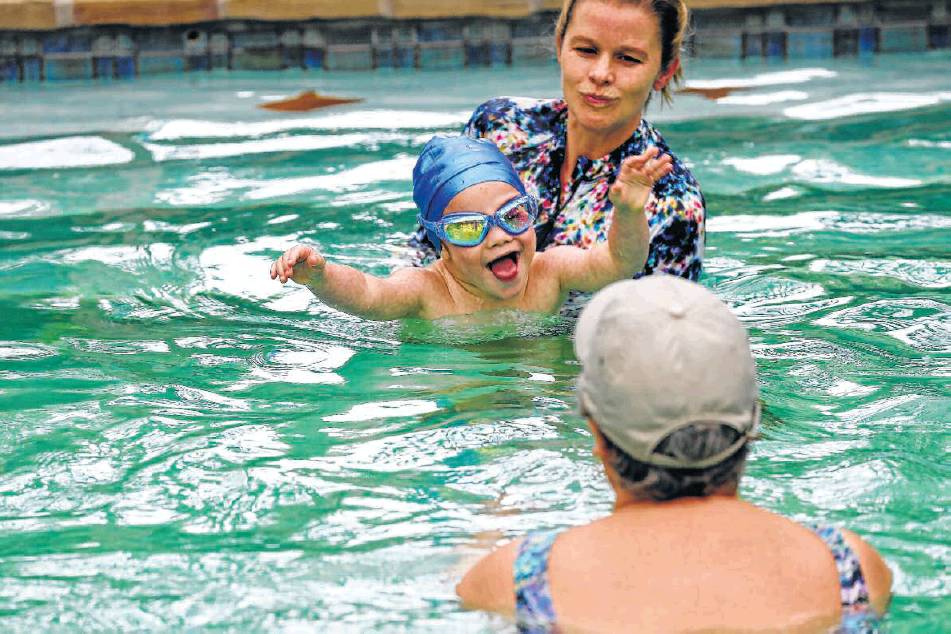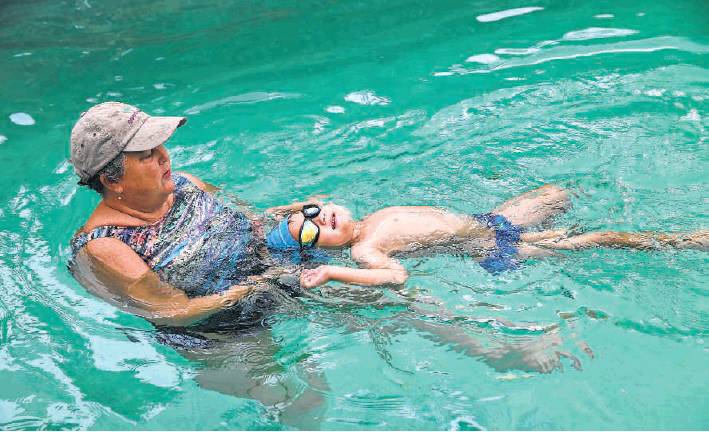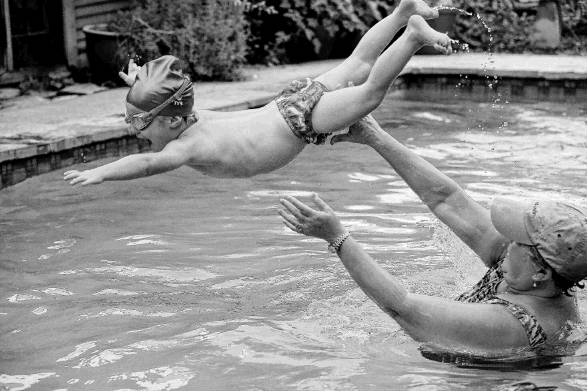Swim teacher gives splash of inclusion
Nonprofit, instructor provide lessons to kids with disabilities
By Vincent T. Davis STAFF WRITER
In Mahncke Park, there’s a backyard pool where parents bring children of all abilities to learn how to swim at each child’s individual pace.
Tykes like Teddy Berios, who has Down syndrome, follow swimming instructor Diana Perry’s directions without hesitation. Wearing a blue swim cap and goggles one recent day, the 3-year-old dived to the bottom of the heated pool to retrieve plastic toys. Pulled in his instructor’s wake, he kicked his feet and swam to his mother’s arms and greeted her with a loud, “Ma!”
His mother, Grace Berios, has also benefited from the lessons. She learned not to be anxious as Teddy went from crying the first day to learning new strokes in Perry’s specially designed 28-by-14-foot pool. She learned that Perry wouldn’t coddle her son and treated him like the other students. And she learned that her son will not leave the pool without a kiss from his instructor.
“He’s challenging himself,” she said as Teddy played with his four siblings after his session. “He’s getting a good comfortable awareness of the water. She believes in him, and we do too.”
Teddy’s fall sessions have ended, but Berios plans to enroll him and his siblings when lessons start again in April.
Perry has taught water safety to students for more than 30 years; 20 percent of her children have documented medical and/or developmental disabilities.
The retired nurse practitioner and developmental disability specialist wants to reach more children who can’t afford swim lessons through Good Swim, the organization she co-founded in 2016. She named the organization after a phrase teammates and coaches often use at swim competitions.
On Saturday, Good Swim will celebrate its new status as a nonprofit with the “Good Swim Starting Block Party,” a fundraiser to help build a year-round indoor swimming facility. The event will take place from noon to 4 p.m., at Grace Northridge, 2659 Eisenhauer Road. Tickets are $10.
Perry said many people with disabilities have adverse reactions to heavily chlorinated community pools, but she plans to carefully monitor chlorine levels in the natatorium to allow children and adults to swim there safely every day. The target completion date is Feb. 2, 2020, Perry’s 60th birthday.
“It won’t be just for folks who can pay for it, but everyone,” Perry, 58, said. “A big part of my mission is to try to help wipe out accidental drownings.”
After watching the program for two seasons, a student’s grandfather suggested Perry grow the program into a year-round facility. Additional plans include reaching out to parents and grandparents who can’t swim to give them lessons and training more instructors.
Perry doesn’t have a memory that doesn’t include swimming. Her mother kept her in lessons that led to synchronized swimming, racing and water polo. She used income from teaching swimming lessons to pay tuition at Trinity and Texas A &M universities.
In 1981, she taught her first child with disabilities, a baby diagnosed with a neurological disorder. She recalls working with the child on mobility, strength and learning how to float.
Perry uses her experience with developmental disabilities and lessons from Claire Timmermans’ book, “How to Teach Your Baby to Swim,” as she provides instruction for each student according to his or her needs.
“I tell the kids, ‘I know your brain knows how to swim and you’re scared,’ ” she said. “It’s my job to prove to you that you know how to swim.”
Good Swim board member Rebecca McMains said parents have to trust the process.
“In terms of disability and that whole spectrum, you have children swimming beside children that they would normally never interact with,” she said. “It levels out the playing field in so many ways.”
Local occupational and physical therapists who work with children with motor delays have recommended the program to their clients.
Teddy’s pathologist, Debra Self, with Easter Seals San Antonio, has referred children to the program for several years. She said it’s often difficult for kids with cognitive or speech delays to follow directions in traditional swim classes, done mainly by demonstration and oral instruction.
“Good Swim has always done an excellent job with our kids of adapting their program to each kid’s specific need,” she said. “They empower the parents and kids.”
During Teddy’s half-hour class, eclectic music drifted from speakers across the covered pool, from Doris Day’s “A Bushel and a Peck,” to Marvin Gaye’s “I Heard It Through the Grapevine.”
Perry shouted, “3-2-1, go!” to Logan Durham in Mandarin, one of15 different languages she uses in honor of the 2016 Olympics.
The 3-year-old plunged underwater and propelled his body toward Perry, who was waiting on diamond-decorated steps.
The toddler surfaced, gave his instructor a thumbs-up sign and yelled, “I did it!”
“I know!” Perry said. “Good boy!”
Logan Durham’s mother, Sheen Durham, said the lessons are a good blend of work and play.
“It makes me feel better as a parent,” Durham, 37, said, “to know my child is learning water skills. I like the diversity. He gets to meet other kids with different needs.”
Perry played calming, faith-based music for 16-year-old Josiah Arazate. His mother, Frances Arazate, 39, videotaped her son as he practiced his backstroke.
At birth, Josiah was diagnosed with cerebral palsy; at 7, he was diagnosed with epilepsy. For eight years, he’s been terrified to have his face in the water, but after one session with Perry, he felt at ease in the pool.
“We’re so proud and happy for him,” his mother said. “Everything about these lessons is a blessing.”
Tears welled in her eyes as she watched the water wash over the teen who doctors said would never walk, talk or go to school.
Now he studies physics.
And at the pool’s edge, anyone listening closely could have heard Josiah quietly uttering words of encouragement to himself.
“Stop the fear,” he whispered. “Relax … open your eyes.”


